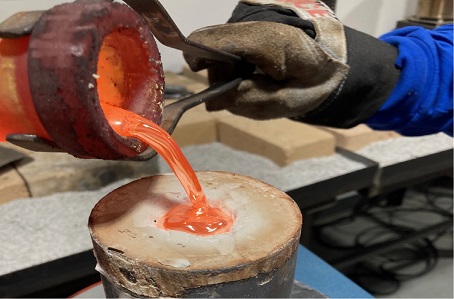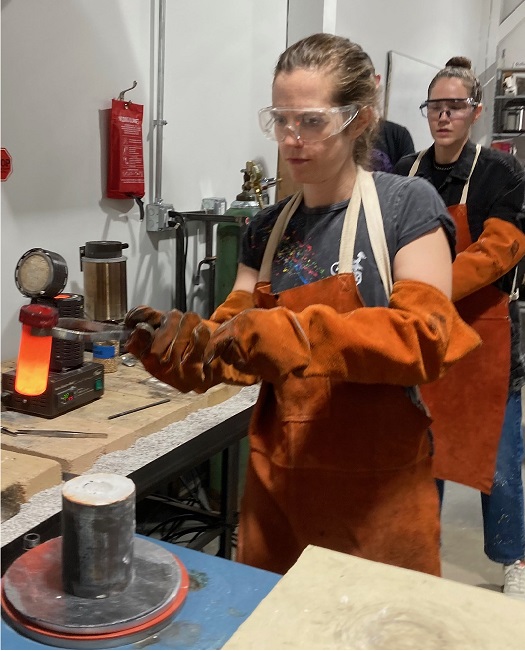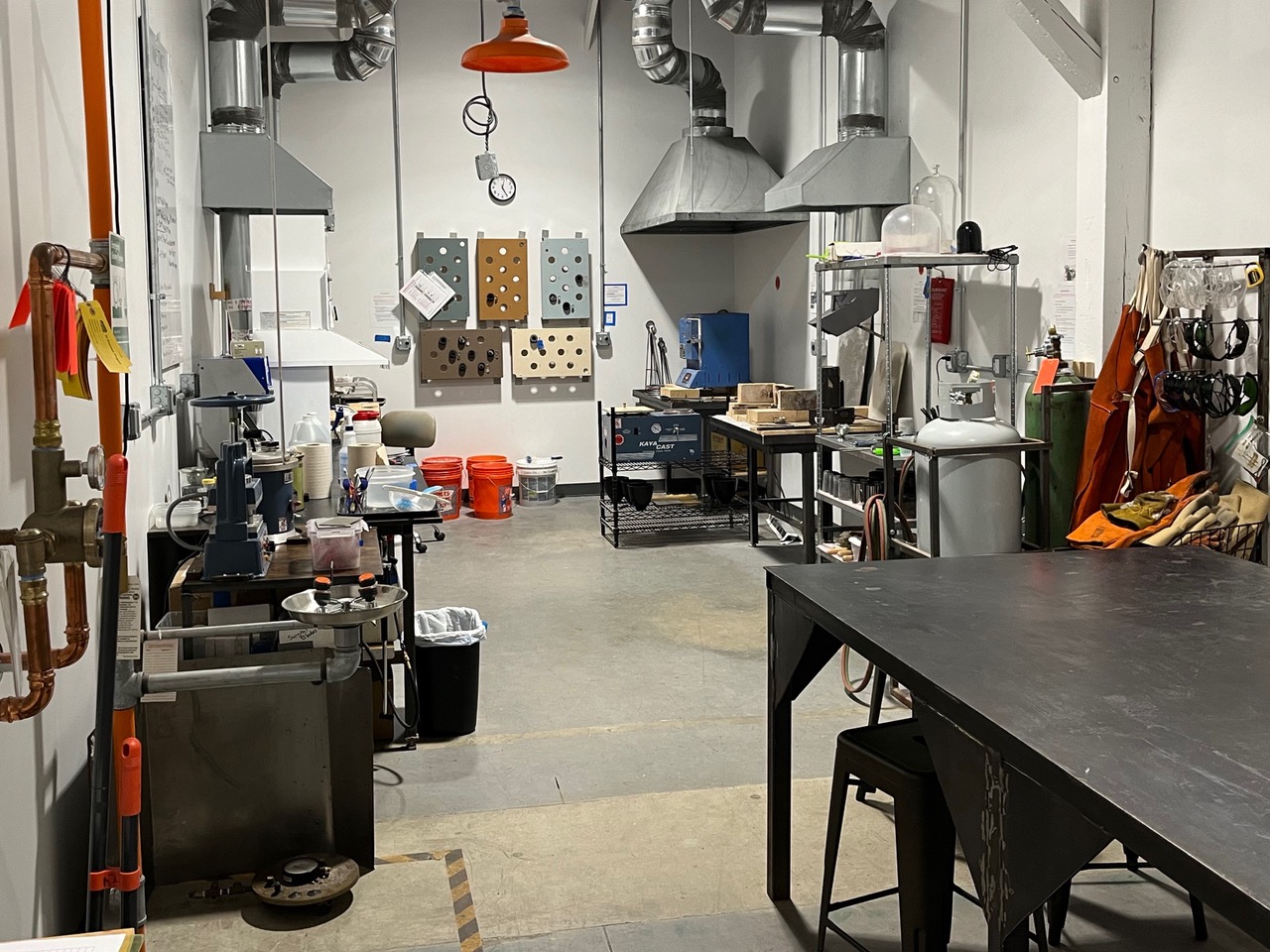Sourcing metal and Category:Casting Shop: Difference between pages
m (formatting) |
|||
| Line 1: | Line 1: | ||
== | {{Shop | ||
|shop_title = Casting Shop | |||
|image = Jan_2024.jpg | |||
|caption = View of the Artisans Asylum Casting Shop | |||
|lead = Tess Faraci | |||
|tool_testers = [https://www.artisansasylum.com/tool-testing Sign up here] | |||
|hours = Same as membership hours | |||
}} | |||
== | == Shop Description == | ||
'''The Artisans Asylum Casting Shop offers equipment and training for two main processes: Sand Casting and Investment Casting.''' | |||
This is | '''The Sand Casting program''' at the Artisans Asylum allows the reproduction of objects in metal with a level of detail suitable for small sculpture, jewelry, and select engineering applications. | ||
— This method is suitable for beginners as well as experienced shop users who are interested in producing a cast piece within the time period of a few hours. | |||
'''The Investment Casting program''' at the Artisans Asylum involves a two to three day process that allows the reproduction of complex shapes in a way that preserves a high level of fine detail. | |||
— This method is suitable for intermediate to advanced shop users interested in achieving exceptionally high quality and precision in their cast objects. | |||
The Casting Shop encourages experimentation and knowledge-sharing for the production of jewelry and artwork achievable using equipment appropriate to our shop. Our facilities are oriented toward hand crafted pieces the size of jewelry and slightly larger — we do not have the resources to support larger foundry work. | |||
=== | == Casting Techniques == | ||
{| class="infobox" cellspacing="5" style="width: 22em; text-align: left; font-size: 88%; line-height: 1.5em;" | |||
! colspan="2" class="infobox-image" | [[File:bronze_casting_resource_pic.jpg|350px|Bronze at 2000 F]] | |||
|- | |||
| colspan="2" | Bronze at 2000 F | |||
|- | |||
|} | |||
'''Investment Casting at the Artisans Asylum,''' sometimes referred to as Lost Wax Casting, starts with the creation of a jewelry-sized object, or “pattern,” often made with wax. | |||
Asylum | |||
— The pattern is encased in investment, a silica and gypsum based substance that resembles plaster. | |||
—Once the investment has set, the wax is then “burnt out” using an overnight kiln program, producing a cavity into which the molten metal can be poured. The kiln program also further hardens the investment. | |||
=== | — At a pre-arranged time the next day, the flask containing the investment is pulled out of the kiln and immediately put on a Vacuum Table, where the molten metal is then poured. | ||
— Once metal has cooled enough to solidify, the hot flask is then “quenched,” or submerged in a bucket of water that quickly liquifies the investment, allowing the finished casting to be easily retrieved. | |||
'''Sand Casting at the Artisans Asylum''' involves the use of Petrobond casting sand, an oil-based sand that significantly reduces the water vapor-produced concerns that come with water-based casting sands. | |||
— Sand casting allows the reproduction of the pattern in a matter of hours, without the destruction of the original pattern. | |||
'''A detailed overview of the Investment Casting process at the Artisans Asylum is available here:''' | |||
https://drive.google.com/file/d/1qid-hoZIWx5stFZQGZ09LY4L7qxmhOA8/view?usp=sharing | |||
'''Details on mold construction with Petrobond Sand are available here:''' | |||
https://drive.google.com/file/d/1mP0Iwi35cRk-C8SCcghau3G-CnKU2bwY/view?usp=sharing | |||
== List of Primary Tools == | |||
'''For Melting Metal:''' | |||
— Electro-melt(s). '''Link to:''' [[Electromelt Tool Resource Page]] | |||
— Oxy-Propane Torch. '''Link to:''' [[Casting Shop Oxy-Propane Torch Resource Page]] | |||
— The shop provides appropriate graphite and clay-silica crucibles. | |||
'''For Investment Casting''' | |||
— Investment Hood | |||
— Kiln. '''Link to:''' [[Sentry Kiln Tool Resource Page]] | |||
— Vacuum Table. ''' Link to: ''' [[Vacuum Table Tool Resource Page]] | |||
— The shop provides Ransom & Randolph Ultra-Vest investment and casting flasks in select sizes. | |||
The product sheet for Ultra-Vest investment can be found here: | |||
https://drive.google.com/file/d/1IVs3M5fmvPaCoeO9CmTQ55ZyzfqehWEH/view?usp=sharing | |||
'''For Sand Casting''' | |||
— The shop provides Petrobond sand, metal mold-making flasks in select sizes, and mold-making tools. | |||
== Tool Documentation == | |||
{| class="wikitable" | |||
!| Tool Info | |||
!| Class | |||
!| Tool Tester(s) | |||
|- | |||
{{ ToolTableItemRed | link=[[Vacuum Table Tool Resource Page]] }} || Alethea Jones | |||
{{ ToolTableItemRed | link=[[Sentry Kiln Tool Resource Page]] }} || Alethea Jones | |||
{{ ToolTableItemRed | link=[[Electromelt Tool Resource Page]] }} || Alethea Jones | |||
{{ ToolTableItemRed | link=[[Casting Shop Oxy-Propane Tool Resource Page]] }} || Alethea Jones | |||
|} | |||
For a YouTube video on how to use the shop's vulcanizer. | |||
https://www.youtube.com/watch?v=XasXISlbQoI | |||
== Shop Safety == | |||
{| class="infobox" cellspacing="5" style="width: 22em; text-align: left; font-size: 88%; line-height: 1.5em;" | |||
! colspan="2" class="infobox-image" | [[File:buddy_up.jpg|200px|Buddy Up!]] | |||
|- | |||
| colspan="2" | Buddy Up! | |||
|- | |||
|} | |||
'''[[Always Cast with a Buddy!]]''' | |||
For safety purposes, the Casting Shop requires that shop users work in pairs when pouring molten metal. | |||
— '''Experienced Casting Buddies can be found through the shop’s Google groups email listserv.''' | |||
To subscribe, send a request email directly to the list: castingshop-users+subscribe@artisansasylum.com | |||
OR | |||
Send and email to the Casting Shop Lead requesting to be manually added: castingshop@artisansasylum.com | |||
'''Proper attire and PPE are required, especially when pouring molten metal:''' | |||
— '''Proper Attire:''' Long Sleeves and Long Pants in Natural Fibers (cotton works well), Closed-toe Shoes (preferably leather). No loose hair or jewelry. | |||
Remember: Cotton will not prevent burns. Natural fibers are a way of ensuring that melted synthetics like polyester do not complicate a burn. | |||
— '''PPE:''' Safety Glasses (shade 3 when torch melting metal or looking into a hot kiln), Leather Apron, Heat Resistant Gloves. Dusk mask or respirator when mixing or cleaning dry investment. | |||
[[IMPORTANT: Please keep tools and work surfaces reasonably clean of dried investment, which contains silica and poses a respiratory hazard when airborne and inhaled.]] | |||
At minimum, dust masks are required when mixing investment and when cleaning dry investment spills. Respirators may provide additional protection. The shop maintains a supply of dust masks. For better fit and protection, frequent shop users may want to supply their own respiratory protection. | |||
== Approved Materials == | |||
'''Pattern Materials approved for use in the Artisans Asylum Casting Shop''' | |||
— Wax (injection or carving)
| |||
— Organics - generally approved, especially for plant materials, but ask first. | |||
— PLA
| |||
— Ask first on Castable 3D printing resins.
| |||
— To add materials to the Approved Pattern Materials List, discuss with a shop steward and propose a workable, clean melt‐out/burnout profile. | |||
'''Metals approved for use in the Artisans Asylum Casting Shop''' | |||
— Brass, Bronze, Copper, Silver, Argentium, Gold, Aluminum, Pewter, Bismuth
| |||
— Metals we cannot do, given high melting points: Titanium, Steel / Iron, Platinum
| |||
— Disallowed Metals: Lead, Magnesium, Anything else with flammability / toxicity issues. | |||
'''No random scrap and no unknowns''' | |||
== Bismuth and Pewter == | |||
Our tools for melting bismuth and Pewter are privately owned and therefor considered red tools. A light training session is required to review shop safety protocols and to familiarize yourself with shop procedures. | |||
Since the temperatures involved are equivalent to that of a hot kitchen oven, no casting buddy is required as long as the shop user knows where first aid supplies can be found, should a burn occur. THIS IS THE SHOP'S ONLY EXCEPTION TO THE SHOP'S RULE OF CASTING WITH A BUDDY WHEN POURING MOLTEN METAL. | |||
When pouring molten bismuth and pewter alone, it is suggested that someone else in the building be made aware that metal is being poured, as a safety backup. | |||
To receive training and testing, contact a tool tester, the Assistant Casting Shop Lead, | |||
or the Casting Shop Lead. Training for bismuth and pewter can take place during the Casting Shop’s monthly Drop-by Hours. | |||
For more information: | |||
https://drive.google.com/file/d/11BUyXPz6xNDHGcTSYjh7JpLnMkvn-KYE/view?usp=sharing | |||
== Contact Us == | |||
— Send an email to the Casting Shop Lead at: castingshop@artisansasylum.com | |||
— To stay informed, subscribe to the CastingShop-Users Google groups email list. | |||
1. Send a request email directly to the list: castingshop-users+subscribe@artisansasylum.com | |||
OR | |||
2. Send an email to the casting Shop Lead requesting to be manually added: castingshop@artisansasylum.com | |||
== Backup Kiln == | |||
For Instruction Manuals to the shop's backup kiln: | |||
https://drive.google.com/file/d/193pKW-FTew5FPsyBq6F8W6TltbeG5V4S/view?usp=sharing | |||
https://drive.google.com/file/d/1oHWqy9EYykvq1yl_T-0AVxZ3M8zRIbRW/view?usp=sharing | |||
== Shop Calendar == | |||
Click below to Visit The Casting Shop Class and Special Event Calendar | |||
<iframe src="https://calendar.google.com/calendar/embed?height=600&wkst=1&ctz=America%2FNew_York&bgcolor=%23ffffff&src=Y2FzdGluZ3Nob3BAYXJ0aXNhbnNhc3lsdW0uY29t&src=cGtxYjlzOXNmYnVwZTl0NmM2cGRydmdwYTh0ZWlxMXZAaW1wb3J0LmNhbGVuZGFyLmdvb2dsZS5jb20&src=cmlqYmhmc29rbnA5dWNuNDg5dXUwbXRsZ2VoZGt2NWJAaW1wb3J0LmNhbGVuZGFyLmdvb2dsZS5jb20&color=%23039BE5&color=%23D81B60&color=%23795548" style="border:solid 1px #777" width="800" height="600" frameborder="0" scrolling="no"></iframe> | |||
== Notes == | |||
This page and all of the subordinate pages were created using a minimal set of Wiki features. If you want to get started with adding content and you think this page looks acceptable, the features used are described in a brief text file located here: | |||
https://www.dropbox.com/scl/fi/c3fervdzz27gsvfzt81ri/Brief-Instructions-on-Wiki-page-creation.txt?rlkey=cyo0gkyty1hiysfsgs6u7cuvq&dl=0 | |||
Revision as of 10:05, 22 February 2024
| Casting Shop | |
|---|---|
| Casting Shop | |
| Lead | Tess Faraci |
| Tool Testers | |
| Hours | Same as membership hours |
Shop Description
The Artisans Asylum Casting Shop offers equipment and training for two main processes: Sand Casting and Investment Casting.
The Sand Casting program at the Artisans Asylum allows the reproduction of objects in metal with a level of detail suitable for small sculpture, jewelry, and select engineering applications.
— This method is suitable for beginners as well as experienced shop users who are interested in producing a cast piece within the time period of a few hours.
The Investment Casting program at the Artisans Asylum involves a two to three day process that allows the reproduction of complex shapes in a way that preserves a high level of fine detail.
— This method is suitable for intermediate to advanced shop users interested in achieving exceptionally high quality and precision in their cast objects.
The Casting Shop encourages experimentation and knowledge-sharing for the production of jewelry and artwork achievable using equipment appropriate to our shop. Our facilities are oriented toward hand crafted pieces the size of jewelry and slightly larger — we do not have the resources to support larger foundry work.
Casting Techniques

| |
|---|---|
| Bronze at 2000 F |
Investment Casting at the Artisans Asylum, sometimes referred to as Lost Wax Casting, starts with the creation of a jewelry-sized object, or “pattern,” often made with wax.
— The pattern is encased in investment, a silica and gypsum based substance that resembles plaster.
—Once the investment has set, the wax is then “burnt out” using an overnight kiln program, producing a cavity into which the molten metal can be poured. The kiln program also further hardens the investment.
— At a pre-arranged time the next day, the flask containing the investment is pulled out of the kiln and immediately put on a Vacuum Table, where the molten metal is then poured.
— Once metal has cooled enough to solidify, the hot flask is then “quenched,” or submerged in a bucket of water that quickly liquifies the investment, allowing the finished casting to be easily retrieved.
Sand Casting at the Artisans Asylum involves the use of Petrobond casting sand, an oil-based sand that significantly reduces the water vapor-produced concerns that come with water-based casting sands.
— Sand casting allows the reproduction of the pattern in a matter of hours, without the destruction of the original pattern.
A detailed overview of the Investment Casting process at the Artisans Asylum is available here:
https://drive.google.com/file/d/1qid-hoZIWx5stFZQGZ09LY4L7qxmhOA8/view?usp=sharing
Details on mold construction with Petrobond Sand are available here:
https://drive.google.com/file/d/1mP0Iwi35cRk-C8SCcghau3G-CnKU2bwY/view?usp=sharing
List of Primary Tools
For Melting Metal:
— Electro-melt(s). Link to: Electromelt Tool Resource Page
— Oxy-Propane Torch. Link to: Casting Shop Oxy-Propane Torch Resource Page
— The shop provides appropriate graphite and clay-silica crucibles.
For Investment Casting
— Investment Hood
— Kiln. Link to: Sentry Kiln Tool Resource Page
— Vacuum Table. Link to: Vacuum Table Tool Resource Page
— The shop provides Ransom & Randolph Ultra-Vest investment and casting flasks in select sizes.
The product sheet for Ultra-Vest investment can be found here:
https://drive.google.com/file/d/1IVs3M5fmvPaCoeO9CmTQ55ZyzfqehWEH/view?usp=sharing
For Sand Casting
— The shop provides Petrobond sand, metal mold-making flasks in select sizes, and mold-making tools.
Tool Documentation
| Tool Info | Class | Tool Tester(s) |
|---|---|---|
| Vacuum Table Tool Resource Page | RED | Alethea Jones |
| Sentry Kiln Tool Resource Page | RED | Alethea Jones |
| Electromelt Tool Resource Page | RED | Alethea Jones |
| Casting Shop Oxy-Propane Tool Resource Page | RED | Alethea Jones |
For a YouTube video on how to use the shop's vulcanizer.
https://www.youtube.com/watch?v=XasXISlbQoI
Shop Safety

| |
|---|---|
| Buddy Up! |
For safety purposes, the Casting Shop requires that shop users work in pairs when pouring molten metal.
— Experienced Casting Buddies can be found through the shop’s Google groups email listserv.
To subscribe, send a request email directly to the list: castingshop-users+subscribe@artisansasylum.com
OR
Send and email to the Casting Shop Lead requesting to be manually added: castingshop@artisansasylum.com
Proper attire and PPE are required, especially when pouring molten metal:
— Proper Attire: Long Sleeves and Long Pants in Natural Fibers (cotton works well), Closed-toe Shoes (preferably leather). No loose hair or jewelry.
Remember: Cotton will not prevent burns. Natural fibers are a way of ensuring that melted synthetics like polyester do not complicate a burn.
— PPE: Safety Glasses (shade 3 when torch melting metal or looking into a hot kiln), Leather Apron, Heat Resistant Gloves. Dusk mask or respirator when mixing or cleaning dry investment.
At minimum, dust masks are required when mixing investment and when cleaning dry investment spills. Respirators may provide additional protection. The shop maintains a supply of dust masks. For better fit and protection, frequent shop users may want to supply their own respiratory protection.
Approved Materials
Pattern Materials approved for use in the Artisans Asylum Casting Shop
— Wax (injection or carving)
— Organics - generally approved, especially for plant materials, but ask first.
— PLA
— Ask first on Castable 3D printing resins.
— To add materials to the Approved Pattern Materials List, discuss with a shop steward and propose a workable, clean melt‐out/burnout profile.
Metals approved for use in the Artisans Asylum Casting Shop
— Brass, Bronze, Copper, Silver, Argentium, Gold, Aluminum, Pewter, Bismuth
— Metals we cannot do, given high melting points: Titanium, Steel / Iron, Platinum
— Disallowed Metals: Lead, Magnesium, Anything else with flammability / toxicity issues.
No random scrap and no unknowns
Bismuth and Pewter
Our tools for melting bismuth and Pewter are privately owned and therefor considered red tools. A light training session is required to review shop safety protocols and to familiarize yourself with shop procedures.
Since the temperatures involved are equivalent to that of a hot kitchen oven, no casting buddy is required as long as the shop user knows where first aid supplies can be found, should a burn occur. THIS IS THE SHOP'S ONLY EXCEPTION TO THE SHOP'S RULE OF CASTING WITH A BUDDY WHEN POURING MOLTEN METAL.
When pouring molten bismuth and pewter alone, it is suggested that someone else in the building be made aware that metal is being poured, as a safety backup.
To receive training and testing, contact a tool tester, the Assistant Casting Shop Lead, or the Casting Shop Lead. Training for bismuth and pewter can take place during the Casting Shop’s monthly Drop-by Hours.
For more information:
https://drive.google.com/file/d/11BUyXPz6xNDHGcTSYjh7JpLnMkvn-KYE/view?usp=sharing
Contact Us
— Send an email to the Casting Shop Lead at: castingshop@artisansasylum.com
— To stay informed, subscribe to the CastingShop-Users Google groups email list.
1. Send a request email directly to the list: castingshop-users+subscribe@artisansasylum.com
OR
2. Send an email to the casting Shop Lead requesting to be manually added: castingshop@artisansasylum.com
Backup Kiln
For Instruction Manuals to the shop's backup kiln:
https://drive.google.com/file/d/193pKW-FTew5FPsyBq6F8W6TltbeG5V4S/view?usp=sharing
https://drive.google.com/file/d/1oHWqy9EYykvq1yl_T-0AVxZ3M8zRIbRW/view?usp=sharing
Shop Calendar
Click below to Visit The Casting Shop Class and Special Event Calendar
<iframe src="https://calendar.google.com/calendar/embed?height=600&wkst=1&ctz=America%2FNew_York&bgcolor=%23ffffff&src=Y2FzdGluZ3Nob3BAYXJ0aXNhbnNhc3lsdW0uY29t&src=cGtxYjlzOXNmYnVwZTl0NmM2cGRydmdwYTh0ZWlxMXZAaW1wb3J0LmNhbGVuZGFyLmdvb2dsZS5jb20&src=cmlqYmhmc29rbnA5dWNuNDg5dXUwbXRsZ2VoZGt2NWJAaW1wb3J0LmNhbGVuZGFyLmdvb2dsZS5jb20&color=%23039BE5&color=%23D81B60&color=%23795548" style="border:solid 1px #777" width="800" height="600" frameborder="0" scrolling="no"></iframe>
Notes
This page and all of the subordinate pages were created using a minimal set of Wiki features. If you want to get started with adding content and you think this page looks acceptable, the features used are described in a brief text file located here:
